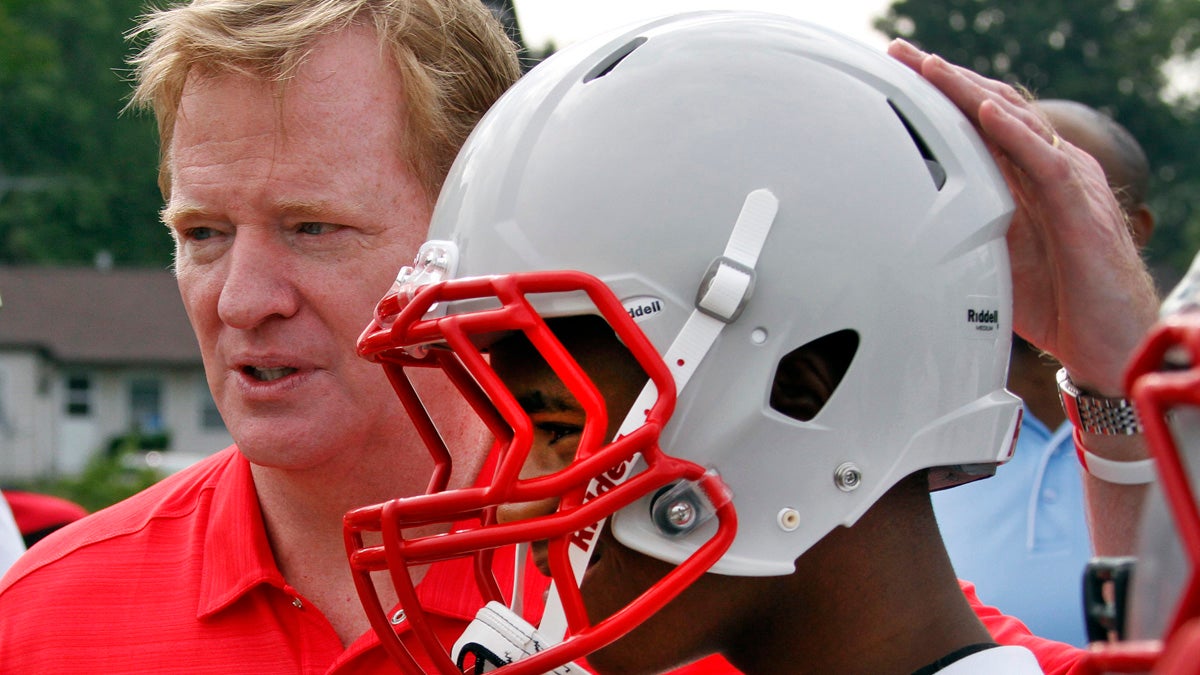Study questions effectiveness of new football helmet technology for young athletes
Listen
In this 2012 photo, NFL commissioner Roger Goodell, left, poses with a youth football player from a low income family who are among thousands nationwide to benefit from a youth safety and helmet replacement program, partially sponsored by the NFL. (Gene J. Puskar/AP Photo, file)
High school athletes and parents might want to rethink buying those more expensive football helmets. Some new research is challenging claims whether they’re any better than old ones.
Mike Morris, a team salesman at Schuylkill Valley Sports in Easton estimates two to three high school football players per team have come in to buy their own helmets.
“They’re looking to get something better,” says Morris. “They’re just looking for something that will minimize the risk of concussion.”
Halfway across the country, Alison Brooks had a similar experience. Brooks specializes in sports medicine at the University of Wisconsin. Parents and young athletes kept asking her which helmets they should get. Many were feeling pressure at school to buy newer ones.
So she designed a study, tracking over 1,000 high school athletes who wore the three most common brands, including some of the newest models. After a year, she parsed out the number of reported concussions based on helmet brand and model and age, to see if there was any big variation.
There wasn’t.
“You know as best we can tell they all adequately do what they were designed to do, which is prevent skull fractures, prevent intracranial bleeds, prevent superficial scalp and face injuries,” says Brooks. “But there’s not any evidence that any one of them is particularly going to reduce your concussion risk.”
Brooks presented the preliminary findings to the American academy of pediatrics this week. She plans to include hundreds of more athletes in the study, once this year’s football season has ended.
Robb Rehberg, a concussion specialist and professor of athletic training at William Patterson University in New Jersey, thinks some helmets are doing a better job at protecting the head and “attenuating the forces that typically cause concussion.” But he isn’t surprised by the findings. He says overall, helmet design has improved a lot compared to ten years ago, but none can or should claim to prevent a concussion.
“I think that as parents – and I’m a parent myself – often times we want to make sure we have everything we can do to protect our kids,” says Rehberg. “And when it comes to a concussion, there is no panacea for that. There’s no one helmet that’s going to prevent that. You can buy the best helmet on the market and you can still receive a concussive blow that’s going to cause a concussion.”
Rehberg says preventing concussions has much if not more to do with learning proper tackling techniques and knowing how to address concussion symptoms if and when they arise to ensure a healthy recovery.
WHYY is your source for fact-based, in-depth journalism and information. As a nonprofit organization, we rely on financial support from readers like you. Please give today.

